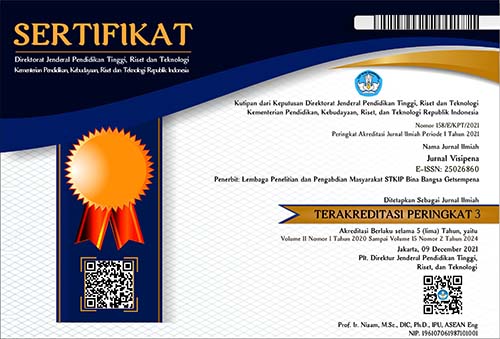PENGEMBANGAN MODUL AJAR TEMATIK SD BERBASIS DIGITAL DI PROVINSI ACEH
Abstract
Penelitian ini memiliki tujuan jangka panjang yaitu: mendukung program pemerintahan Republik Indonesia dalam rangka mendukung program MBKM melalui inovasi yang dilakukan dalam pembelajaran di kelas berupa modul ajar tematik SD berbasis digital terintagrasi KBAT. Adapun target khusus yang ingin dicapai dalam penelitian ini yaitu (1) Merancang modul ajar tematik SD berbasis digital terintagrasi KBAT bagi siswa SD di Provinsi Aceh, (2) Merancang modul ajar tematik SD berbasis digital terintagrasi KBAT yang dapat membantu aktivitas siswa dan guru untuk mengimplementasikan pembelajaran tematik di SD, (3) Mengetahui efektifitas modul ajar tematik SD berbasis digital terintagrasi KBAT bagi siswa SD di Provinsi Aceh. Penelitian ini merupakan penelitian pengembangan Borg and Gall. Model pengembangan produk pembelajaran ini merupakan model yang disusun secara terprogram dengan urutan yang sistematis dan memenuhi karakreristik siswa dalam belajar. Berikutnya untuk menguji efektifitas dari modul yang dikembangkan menggunakan penelitian eksperimen. Data yang dihasilkan dalam penelitian ini yaitu data validitas, kepkraktisan dan efektifitas dari modul ajar tematik SD berbasis digital terintagrasi KBAT yang di kembangkan. Target keluaran yang ingin dicapai di pada penelitian ini yaitu (1) framework pendekatan tematik di jenjang SD, (2) Panduan pengembangan modul ajar tematik jenjang SD moda dalam jaringan, luar jaringan dan campuran, (3) Perangkat ajar tematik moda dalam jaringan di kelas awal, (4) Perangkat ajar tematik moda luar jaringan di kelas awal, (5) perangkat tematik moda campuran di kelas awal. Riset ini akan memberikan kontribusi yang sangat penting dalam Rencana Strategis riset unggulan Universitas Bina Bangsa Getsempena dalam bidang inovasi pendidikan, dan riset ini juga akan menyelesaikan permasalahan pada kualitas Pendidikan di Provinsi Aceh.
Abstract
This research has a long-term goal, namely: to support the government program of the Republic of Indonesia in order to assist MBKM program through innovations that is implemented in the classroom learning in form of thematic teaching module of elementary school KBAT-integrated digital based. The specific targets to be achieved in this study are (1) Designing thematic module of elementary school KBAT-integrated digital based for elementary school students in Aceh Province, (2) Designing thematic learning of elementary school KBAT-integrated digital based that can help students and teacher to implement thematic learning in elementary schools, (3) Knowing the effectiveness of the thematic learning module of elementary school KBAT-integrated digital based for elementary school students in Aceh Province. This research is development research of Borg and Gall. This advancement research is arranged programmatically in a systematic order and meets the characteristics of students in learning. Further to test the effectiveness of the modules that is developed using experimental research. The data produced in this study are data on the validity, practicality and effectiveness of the thematic learning of elementary school KBAT-integrated digital based that is developed. The output targets to be achieved in this study are (1) thematic approach framework at the elementary level, (2) Guidelines for the development of thematic teaching modules at the elementary level in network, off-network and mixed modes, (3) Thematic teaching devices for online modes in the early grades, (4) Thematic teaching devices for off-network modes in the early grades, (5) mixed mode thematic devices in the early grades. This research will give vitally important contribution to the Strategic Plan for the feature research of Bina Bangsa Getsempena University in the field of educational innovation, and this research will also solve problems in term of education quality in Aceh Province.
Downloads
References
Aini, Q., & Relmasira, S. C. (2018). Penerapan Pembelajaran Tematik Integratif Berbasis Kontekstual untuk Meningkatkan Keaktifan dan Hasil Belajar Siswa Kelas 1 SD. Sekolah Dasar: Kajian Teori Dan Praktik Pendidikan, 27(2), 124–132. https://doi.org/10.17977/um009v27i22018p124
Anthonysamy, L., Koo, A. C., & Hew, S. H. (2020). Self-regulated learning strategies and non-academic outcomes in higher education blended learning environments: A one decade review. Education and Information Technologies. https://doi.org/10.1007/s10639-020-10134-2
Chen, X., Xie, H., Zou, D., & Hwang, G.-J. (2020). Application and theory gaps during the rise of Artificial Intelligence in Education. Computers and Education: Artificial Intelligence, 1(August), 100002. https://doi.org/10.1016/j.caeai.2020.100002
Cranitch, M., & MacLaren, D. (2018). Chapter 18 Building Intellectual Capacity for Burma: the Story of Australian Catholic University’s Tertiary Education Program with Burmese Refugee and Migrant Students. 263–267. https://doi.org/10.1108/s2055-364120180000013018
Karli, H. (2016). Penerapan Pembelajaran Tematik SD Di Indonesia. EduHumaniora |Jurnal Pendidikan Dasar Kampus Cibiru. https://doi.org/10.17509/eh.v2i1.2752
Kasmini, L., & Mardhatillah. (2020). The influence of aceh culture-based learning model (MPB2A) integrated media information communication and technology on student learning outcomes in science learning. International Journal of Advanced Science and Technology, 29(5), 2051–2058.
Landry, S. H., Assel, M. A., Carlo, M. S., Williams, J. M., Wu, W., & Montroy, J. J. (2019). The effect of the Preparing Pequeños small-group cognitive instruction program on academic and concurrent social and behavioral outcomes in young Spanish-speaking dual-language learners. Journal of School Psychology, 73(November 2018), 1–20. https://doi.org/10.1016/j.jsp.2019.01.001
Li, J., Antonenko, P. D., & Wang, J. (2019). Trends and issues in multimedia learning research in 1996–2016: A bibliometric analysis. Educational Research Review, 28(November 2018), 100282. https://doi.org/10.1016/j.edurev.2019.100282
Lindell, T. L. (2020). Exploring teachers’ increased knowledge of the potential of mobile phone use: pilot study reducing the difference between students’ and teachers’ ideas. Education and Information Technologies. https://doi.org/10.1007/s10639-020-10138-y
Nikiforos, S., Tzanavaris, S., & Kermanidis, K. L. (2020). Virtual learning communities (VLCs) rethinking: Collaboration between learning communities. Education and Information Technologies. https://doi.org/10.1007/s10639-020-10132-4
Sekeris, E., Verschaffel, L., & Luwel, K. (2019). Measurement, development, and stimulation of computational estimation abilities in kindergarten and primary education: A systematic literature review. Educational Research Review, 27(January), 1–14. https://doi.org/10.1016/j.edurev.2019.01.002
Şen, E. Ö., & Hava, K. (2020). Prospective middle school mathematics teachers’ points of view on the flipped classroom: The case of Turkey. Education and Information Technologies. https://doi.org/10.1007/s10639-020-10143-1
van Alten, D. C. D., Phielix, C., Janssen, J., & Kester, L. (2019). Effects of flipping the classroom on learning outcomes and satisfaction: A meta-analysis. Educational Research Review, 28(November 2018), 1–18. https://doi.org/10.1016/j.edurev.2019.05.003





















